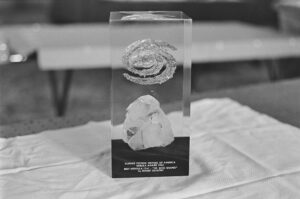by Michael Capobianco
Less than a year after SFWA founder and President Damon Knight created the Nebula Award, the first Nebula Awards Ceremonies were held on March 11, 1966. Why “Nebula?” The name was first introduced without explanation in the inaugural ballot mailed out to SFWA members. According to Robert Silverberg, SFWA’s second president, “Far as I know, Damon just liked the idea of calling it a Nebula. None of us saw any reason to object.”
The ceremonies were held in two locations: one in New York City and the other in Beverly Hills, CA. The New York ceremony was held in what Knight later characterized as a “grungy” upstairs room at the Overseas Press Club on 45th Street in Midtown Manhattan. The California Nebulas were presented at a more upscale location: McHenry’s Tail O’ the Cock, a large, English–tavern style restaurant on Beverly Hills’ Restaurant Row.
Title: 1965 Nebula Award trophy, Tricon. Date: 1966. Collection: Jay Kay Klein photographs and papers on science fiction fandom. Owning Institution: UC Riverside, Library, Special Collections and University Archives. Source: Calisphere.
Partially because the rules hadn’t been sufficiently worked out, more works were nominated for the awards and on the final ballot than would ever be the case again: 27 for “short story” alone.
Ninety attendees were present in New York, and seventy attended the ceremony in California. On the way to the New York Nebulas, both Knight and SFWA Secretary-Treasurer Anne McCaffrey were involved in “minor” automobile accidents. In the Bulletin account, there was no indication of who was at fault, but both accidents involved trucks and both cars, Knight’s Dodge Dart and McCaffrey’s VW, were totaled.
The new award trophies, seen at the ceremonies for the first time, were designed by Judith Ann Lawrence (Mrs. James Blish) and Kate Wilhelm (Mrs. Damon Knight) and manufactured by Daniel Levy of the Richley Company. The unique design was based on a block of clear Lucite with “embedments” and featured a spiral galaxy made of glitter, hand-made by Lawrence, and a rock crystal “landscape.” No one pointed out that the spiral was a galaxy, not a nebula; at the time, some writers still thought of the Andromeda Galaxy (M31) as a nebula.
In both locations, the awards presentation was preceded by a banquet and included a film screening. In New York, Ed Emshwiller’s experimental movie Relativity was shown, while in Beverly Hills, Gene Roddenberry showed the two pilot episodes for the soon-to-premier Star Trek. (Subsequently, SFWA Vice President Harlan Ellison invited members to stay with him at his Coy Drive residence to pitch to Roddenberry, but by the November issue of the Bulletin, he had withdrawn the offer and lambasted SFWA members for costing the producers $12,000 and wasting their time with the attitude of “Let’s grab a few bucks from those schmucks, they don’t know what’s happening.”)
The winner for best novel was Dune by Frank Herbert. “The Saliva Tree” by Brian W. Aldiss and “He Who Shapes” by Roger Zelazny were tied for the novella after two tie ballots. “The Doors of His Face, the Lamps of His Mouth” (also by Roger Zelazny) won for novelette, and Harlan Ellison won for short story with “‘Repent, Harlequin!’ Said the Ticktockman.” A complete list of Nebula Nominees for 1965 is available at our Nebulas website.
The awards were presented by Knight in New York and Robert Bloch in California. All the winners accepted their awards in person: Aldiss and Zelazny in New York and Herbert and Ellison in Beverly Hills. Aldiss had been brought to New York from Oxford, England, thanks to his publishers: Ace Books, Harcourt, Brace, and World, and The Magazine of Fantasy and Science Fiction.
In SFWA Bulletin #5 (April 1966), the Nebula winners were announced, and, for the first time, members who hadn’t attended either ceremony saw what the award trophies looked like. SFWA Bulletin #6 (June 1966) contained the new Nebula Rules. As the result of a vote solicited by ballot from SFWA members, several changes were made to the 1966 awards, the most significant of which was to include fantasy in the types of works allowed.
Nebula Awards Stories 1965, edited by Damon Knight, was published by Doubleday & Co. the following year and in paperback by Pocket Books in 1967. According to Silverberg, Knight himself agented the first couple of Nebula Anthologies. In addition to the winning short works (including both winning novellas) and an introduction by Knight, it contained the nominated short stories “Balanced Ecology” by James H. Schmitz, “Computers Don’t Argue” by Gordon Dickson, and “Becalmed in Hell” by Larry Niven, as well as the Knight-selected New Wave short story “The Drowned Giant” by J. G. Ballard. This set the format for future volumes, containing the winners plus several nominated stories to fill out the page count and, occasionally, an “editor’s choice.” The book was dedicated “in gratitude and affection” to the memories of C. M. Kornbluth, Henry Kuttner, Richard McKenna, H. Beam Piper, and E.E. Smith. Nebula Awards Stories 1965 had many editions, including from Gollancz in the UK and the Science Fiction Book Club, and fulfilled its primary goal, keeping SFWA afloat.
The first Nebula Awards anthology led to an unbroken (although sometimes much delayed) series of annual Nebula Award compilations, up to number 59 at present. From 2000 on, they have been called Nebula Showcases. No other annual science fiction and fantasy anthology comes close to this record for continuity. Nebula Awards Showcase 60 is planned to appear at this year’s SFWA Nebula Conference as part of SFWA 60th Anniversary Celebration.
Explore more articles from THE HISTORY FILES
 Michael Capobianco has published two solo science fiction novels, Burster and Purlieu, as well as short fiction. He is co-author, with William Barton, of the critically acclaimed hard SF novels Iris, Alpha Centauri, and White Light and the retroactively alternate history novel Fellow Traveler.
Michael Capobianco has published two solo science fiction novels, Burster and Purlieu, as well as short fiction. He is co-author, with William Barton, of the critically acclaimed hard SF novels Iris, Alpha Centauri, and White Light and the retroactively alternate history novel Fellow Traveler.
Capobianco served as President of Science Fiction and Fantasy Writers of America (SFWA) from 1996–1998 and again from 2007–2008. He received the Service to SFWA Award in 2004 and is currently SFWA’s Authors Coalition Commissioner and a member of its History Committee. In August 2024, he was appointed as SFWA’s Past President Advisor.


